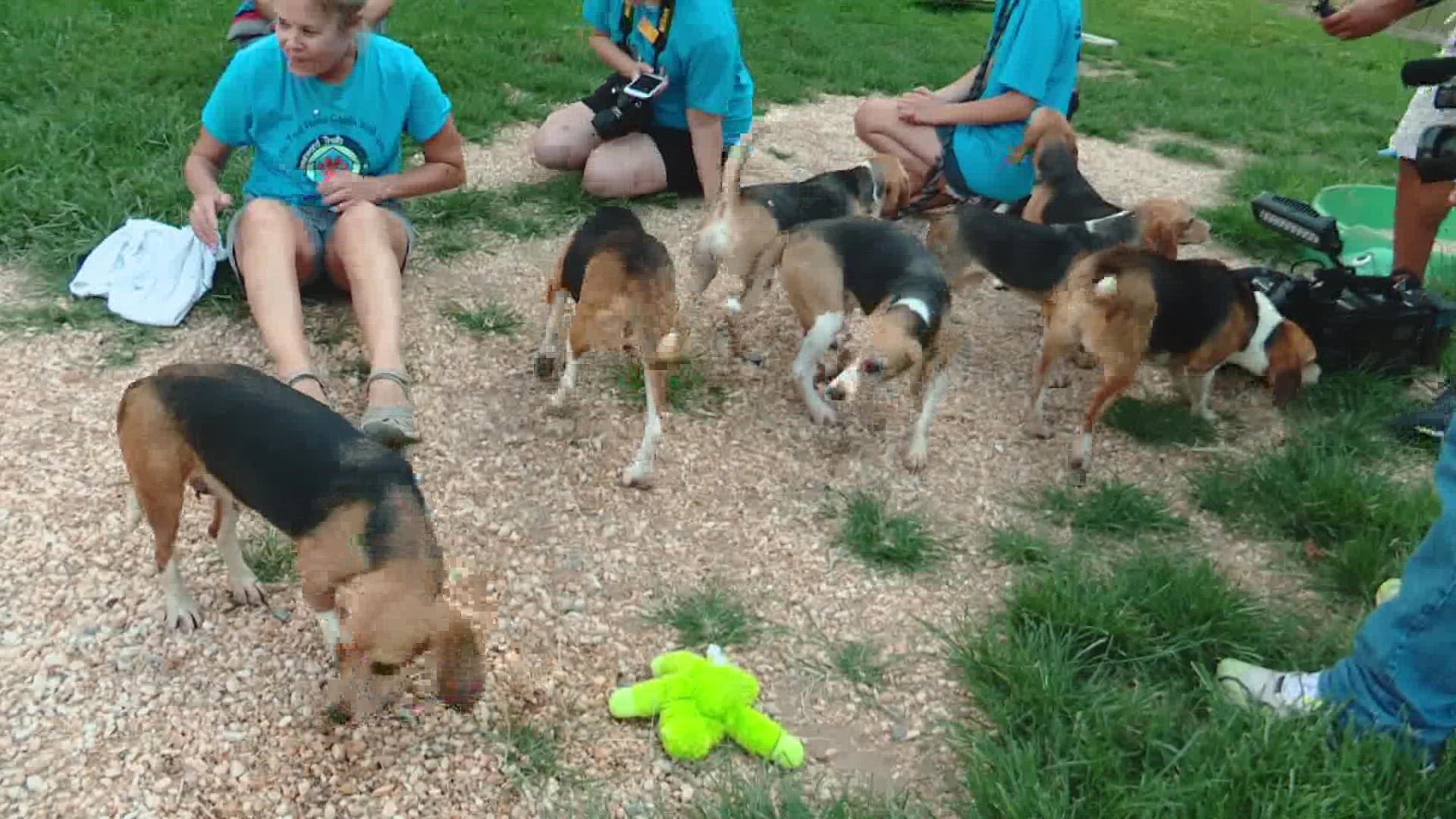LEWISTON, Maine — The Humane Society of the United States has a big job on its hands. The organization must find homes for about 4,000 beagles rescued from a breeding facility in Virginia that bred the dogs to be used in lab experiments.
The Humane Society said the last group of 312 beagles was removed from the facility on Sept. 1. They will be taken to shelters and other rescue partners, some of which are in Maine and New Hampshire, to find loving homes.
One of those shelters is the Greater Androscoggin Humane Society, which is preparing to welcome six of the rescued beagles. Executive Director Katie Lisnik said it will take some special attention to make sure the dogs settle in well.
"They've not been in a differing environment than a laboratory setting. So, it's probably going to be very shocking to them to see things like cars and couches, you know, if they go into homes or foster homes," she explained. "So, we're planning to do real slow introductions to start getting them used to what it's going to be like living in a home."
The dogs will spend 14 days in quarantine after they arrive in Maine to undergo medical testing and examinations to ensure they're healthy. The Greater Androscoggin Humane Society is accepting donations of several varieties to help them care for the animals.
"We just have had to be patient and willing to not really know what we're going to be getting until we get them. Which, you know, I think they said it's a little bit like Christmas day, you know?" Lisnik said. "You just get surprised on the day of, and regardless, we know that they are going to be amazing dogs, and we'll be able to place them into loving homes."
The New Hampshire Society for the Prevention of Cruelty to Animals (NHSPCA) also received seven dogs from the Humane Society of the United States as part of the first group of beagles to be removed from the Virginia facility.
“Four thousand is incomprehensible. Really. It’s just an exorbitant number of animals. And to think that each one is an individual, each one needs to be managed and cared for and then re-homed in this wonderful case that they have this opportunity now," NHSPCA Executive Director Lisa Dennison said. "So, yeah, when we first heard about this, it was a staggering number, and we’re just so delighted to be able to be a part of it.”
She said the seven puppies at the NHSPCA were part of a group of 33 beagles that came to New Hampshire and Vermont. Each dog had to be quarantined for 48 hours, meaning they had to be contained to a certain area away from the other animals at the facility to undergo medical testing and examinations to ensure they were healthy.
“The good news is, they are not going to be subjected to a life in a lab. I’m so excited that they are having their first opportunities to walk on grass," Dennison said with a smile. "They’re learning to be dogs and not subjects. They’re learning what it’s like to be held and loved, and they are wiggly and squiggly, and they just have such a bright future ahead of them."
Dennison said the NHSPCA received about 40 new applications on Thursday alone. Obviously, the math doesn't work out in a way where everyone will get a beagle. However, if you apply for a beagle and don't get one, the NHSPCA keeps applicants on file for future adoption opportunities, be they a beagle or another breed.
“Beagles are in the hound family, right? So, if you think about, you know, what the characteristics of that dog are, what they sound like when they bark – and they howl. Some people are like, 'Oh, it warms my heart every time I hear that little beagle cry,’ and other people are like, ‘Oh my gosh, it makes me crazy every time I hear that beagle cry,’" Dennison explained. "So, again, everything is different, right? There’s a right fit for every family, and we want to make sure it’s the best it can be.”
The Envigo breeding and research facility in Cumberland, Virginia, is contracted to breed dogs for the purpose of research and scientific experiments, regulated by the U.S. Department of Agriculture. Federal investigators claim the facility performed unnecessarily painful medical experiments on dogs and puppies, including euthanasia without sedatives.
A senior U.S. District Court Judge Norman K. Moon requested in early July that 4,000 beagles be removed from Envigo and put up for adoption. According to court documents, Moon required Envigo to pay $100 per dog, and $150 per dog nursing a litter younger than 8 weeks, to help defray the costs to the shelters preparing the dogs for adoption.

